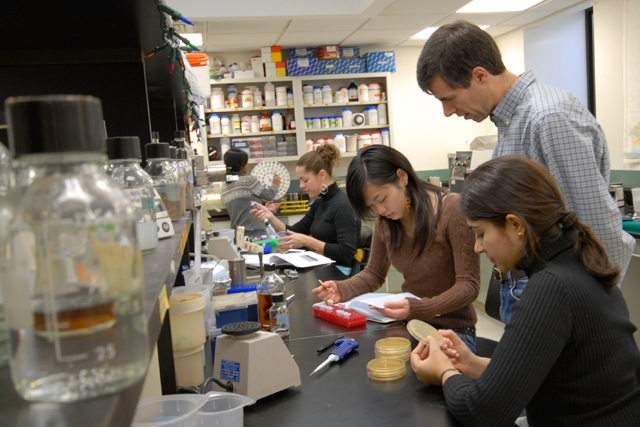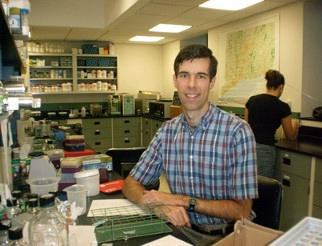NSF Supports Holmes’ Gene Expression Research

For the next three years, the National Science Foundation (NSF) will support gene expression research led by Scott Holmes, associate professor of molecular biology and biochemistry.
On March 2, the NSF awarded Holmes a $599,832, three-year grant for his studies on “Epigenetic Silencing of Gene Expression in Saccharomyces cerevisiae.”

Gene expression refers to the observable characteristics generated on a molecular level by a particular sequence of DNA or gene; epigenetic controls are essential in maintaining the specific patterns of gene expression that distinguish hundreds of distinct cell types in skin, muscles and other types of tissue.
“I’m thrilled to get the funding,” Holmes says. “It’s very timely for us, and it’s a testament to the great work that graduate and undergraduate students have done in the lab over the last few years.”
Holmes, currently working with four graduate and four undergraduate students, uses a simple budding yeast, Saccharomyces cerevisiae, to study gene expression. Yeast uses an epigenetic gene repression mechanism, known as “silencing” to control the genes responsible for determining cell type.
“Two organisms, or two cells within the same organism, can have identical genetic information, or the same DNA sequence, but can have very different characteristics and functions,” Holmes explains. “We want to know how the gene expression patterns that determine cell type are first established, and then propagated as cells divide.”
The DNA in cells is organized into structures known as chromosomes. A key mechanism for controlling whether genes are on or off is by altering the structure of the chromosome. Once established, these alterations can become a stable, heritable part of the chromosome.
The nature of these structures and the manner in which they are inherited is not clear, Holmes says. Studies conducted on yeast will reveal the basic mechanisms of epigenetic inheritance.
This is the ninth year the NSF has supported Holmes’s research on yeast. He incorporates this research into the spring semester course MB&B 294, Advanced Laboratory in Genetics and Molecular Biology, which is required for undergraduate majors in the MB&B Department.
“This course is designed to familiarize undergraduates with the methods and approaches of the field in the context of pursuing novel research questions,” Holmes explains.
He also has partnered with a local high school biology teacher to devise and implement lesson plans, focusing on key concepts in genetics. Advanced students from this high school also visit the research lab to shadow graduate students.

